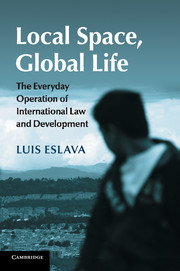Book contents
6 - The local self of the international
Published online by Cambridge University Press: 05 August 2015
Summary
This final chapter of the book engages in more general terms with the everyday operation of international law and the development project. In particular, I return to and develop the ideas advanced in Chapter 1 in relation to the substantive and methodological implications of studying international law and the development project as they become present through the material and social body of the world. To advance this task, I employ the notions of authority, responsibility and resistance as three important analytical frames through which to assess the functioning of international law and the development project. As I show below, these three frames help us to understand the sociopolitical and jurisprudential implications of international law and development, especially when these twin projects are approached ethnographically.
In the first section of the chapter, I discuss the work that law has been doing in relation to the routinization of the international as local in Bogotá, and how this work is connected with the performance of international authority within the municipal context. In the second part, I reflect on how, as a result of this local routinization of the international (in a process that I call ‘autochthonous internationalization’ or ‘internationalization from within’), international responsibility is often spread, and hence diluted, across different levels of governance while still making locals the ultimate bearers of global ambitions and obligations. In the third part of the chapter, I examine how certain forms of resistance have been precluded, and others made available, as a result of this localization of the international.
As I will argue, paying attention to the issue of resistance confirms that the current global order is far from the deterritorialized and decentred system described, for example, by Michael Hardt and Antonio Negri.As is particularly clear in their most famous book, Empire – a touchstone for discussions about the institutional mechanics and social implications of today's global order – Hardt and Negri do not display a special interest in the particular spatiality and local processes of subjectification that have accompanied the construction of, and resistance to, the present global order or its modality of sovereign power and exercise of authority.
- Type
- Chapter
- Information
- Local Space, Global LifeThe Everyday Operation of International Law and Development, pp. 237 - 292Publisher: Cambridge University PressPrint publication year: 2015



